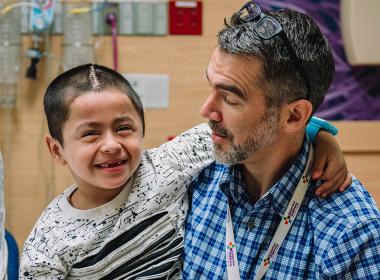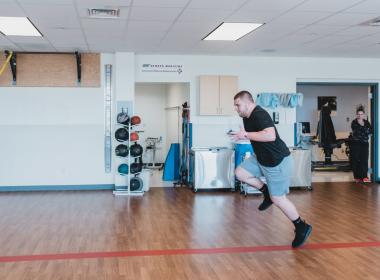What to Expect During Your Sedation Services Appointment Use simple words your child will understand. Encourage your child to discuss feelings and ask questions about the upcoming experience but be careful not to force a discussion if your child does not seem ready. Be honest. If you do not know the answer to your child’s question
Urology Research Connecticut Children’s pediatric urology physicians and researchers are actively involved in clinical and translational research related to outcomes and treatment of urologic conditions including hydronephrosis, solitary kidney, ureteropelvic junction obstruction, hypospadias
Article
Swimmer’s Ear: 7 Things to Know and How to Treat It By Christopher Grindle, MD: This article was originally published in May 2022 and was updated for accuracy in May 2025. Ah, summer—the time when our active kids jump right in the water for lots of swimming. Then, ouch. Or, double ouch. Sometime later, the ear pain sets in, maybe with some other unpleasant
Article
Happy Holidays During COVID! Week #4: Care Packages to Make Quarantine Special During COVID-19, your family may have lots of people to thank and in-person celebrations to make up for. So in time for Hanukkah, Christmas and Kwanzaa, here’s a care package how-to for spreading holiday cheer. This is the fourth week of Connecticut Children’s holiday series Article
5 Mental Health Tips for Kids This Winter By Melissa Santos, PhD: Winter darkness and colder weather can cause your child’s mood and health habits to take a dive. To help, start with the basics! Connecticut Children’s pediatric psychologist Melissa Santos, PhD, shares her top five tips.
Article
Grow Inspiring: Natalia’s Story The staff at the hospital where Natalia Rodriguez Sabala was born hadn’t seen a patient like her in seven years. She was born with cloacal exstrophy, also known as OEIS syndrome: Her bladder and portions of her large intestine were on the outside of her belly, and her bladder was
Article
Grow Fun: Sofia’s Story When 5-year-old Sofia Cortese hears she won’t be going into school today – whether from a doctor’s appointment, school holiday or because classes will be online this week – she has a predictable reaction. “She’ll say, ‘But my friends are going to miss me!’” says mom Renata. And
Article
Grow Fearless: Fernando’s Story Norma Moreira was returning home from work when she received the phone call: Her 6-year-old son, Fernando, was hit by a car while crossing the street in their East Hartford neighborhood. The car had been going very fast. Fernando might not survive. Fernando was raced to
Article
Grow Committed: Zach’s Story Imagine: You are a star football player walking onto the field for the first game of your senior year. It is Friday night, and the stands are packed. You’ve already racked up three all-conference and two all-state selections in your first three years of high school; you’ve been
eCheck-In for Your Appointment Skip the front desk and check-in from your phone using MyChart’s Hello Patient feature. Connecticut Children’s is piloting Hello Patient at our Specialty Care Center in Glastonbury. If you have an upcoming appointment in Glastonbury, you will have the option to check in using
Contact Us Contact Us Connecticut Children’s Medical Center’s main campus is located at 282 Washington Street in Hartford, Connecticut. Connecticut Children’s has several other locations throughout the state and in Massachusetts. Our main phone number is 860.545.9000. Important Phone
Article
Cardiac Arrest and Sports Injuries: What Parents Should Know By Donna M. Pacicca, MD: All parents of aspiring athletes think about their child’s safety—it’s only natural. But when events like what happened to Buffalo Bills’ Damar Hamlin take over the headlines, we can’t help but ask questions. Why did this football player’s heart stop on the field at just 24 years